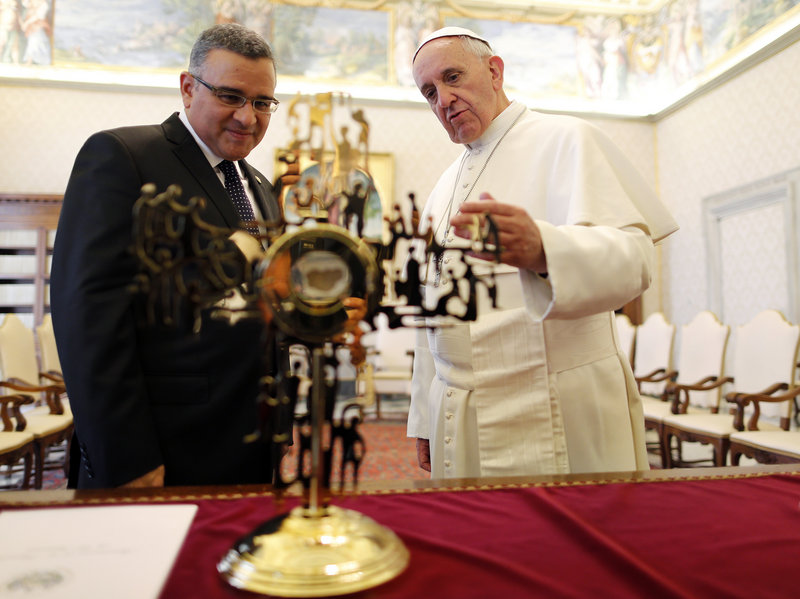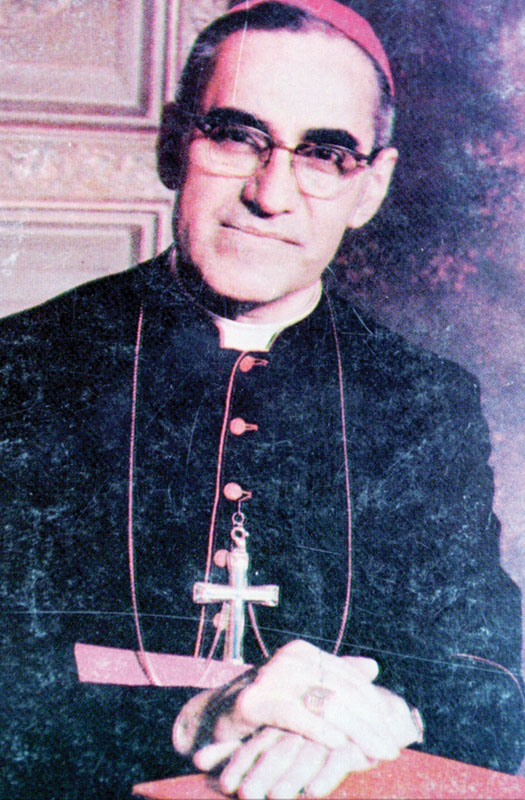VATICAN CITY – El Salvador’s president gave Pope Francis a relic of assassinated Archbishop Oscar Romero on Thursday amid mounting indications that the Vatican might soon move to beatify him.
President Mauricio Funes flew from El Salvador to Rome for a 12-minute meeting with Francis to encourage the beatification, the first step to possible sainthood. A Vatican communique said the talks focused on Romero “and the importance of his witness for the entire nation.”
During the audience, Funes presented Francis with a bloodstained piece of the priestly vestments Romero was wearing when he was gunned down by right-wing death squads on March 24, 1980, as he celebrated Mass in a hospital chapel.
Romero’s long-shelved sainthood case has been given new life by the election of the first Latin American pope and a pro-beatification campaign by Funes’ government, which is made up of former guerrilla fighters who battled the same military hierarchy that Romero denounced.
Earlier this week, El Salvador’s ambassador to the Holy See, Manuel Lopez, said Funes’ “principal objective” in traveling to Rome was to press for the beatification and thank Francis for the support he has already given it.
Lopez said Francis told him in their first audience after his election that “I hope that under this pontificate we can beatify him.”‘ Lopez said Francis said something similar to Funes’ wife, who headed El Salvador’s delegation to the pope’s installation Mass.
The Vatican spokesman, the Rev. Federico Lombardi, said it was significant that the communique about the talks named Romero — an unusual break with protocol that signaled that Francis was indeed very much in favor of the slain archbishop’s sainthood case.
The death of Romero, a human rights proponent who spoke out for the poor and against repression by the Salvadoran army, presaged a civil war that killed nearly 75,000 over the next 12 years.
The government and guerrillas reached a peace treaty in 1992, and five years later the Vatican opened a sainthood case for Romero, who is considered a martyr for the faith.
The cause stalled under two successive popes who were hostile to liberation theology, the Latin American-inspired view that Jesus’ teachings imbue followers with a duty to fight for social and economic justice. Some say El Salvador’s conservative governments headed by the right-wing Nationalist Republican Alliance party, or Arena, blocked the cause.
The Funes government, which came into power in 2009, has firmly supported it.
In 2010, Funes publicly apologized on behalf of the state for the assassination. That same year, the government opened its first embassy to the Holy See in Rome — a clear indication that it wanted better, closer ties with the Vatican and a sign of intent and interest in Romero’s cause. Previously, its embassy in London handled Vatican affairs.
In 1993, a U.N.-sponsored truth commission determined that the assassination had been ordered by a former army major and Maj. Roberto D’Abuisson, the Arena founder. D’Abuisson had died years before. An amnesty law was passed shortly before the findings were made public.
Arena never accepted the results of the commission’s investigation.
Send questions/comments to the editors.




Success. Please wait for the page to reload. If the page does not reload within 5 seconds, please refresh the page.
Enter your email and password to access comments.
Hi, to comment on stories you must . This profile is in addition to your subscription and website login.
Already have a commenting profile? .
Invalid username/password.
Please check your email to confirm and complete your registration.
Only subscribers are eligible to post comments. Please subscribe or login first for digital access. Here’s why.
Use the form below to reset your password. When you've submitted your account email, we will send an email with a reset code.